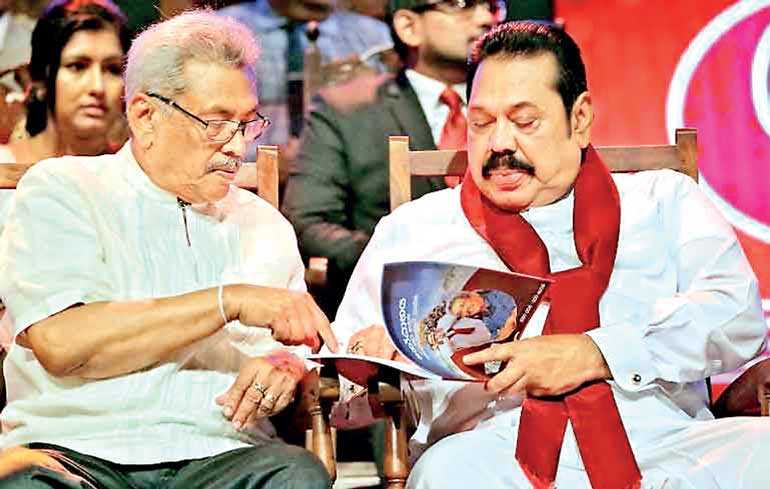Wednesday Mar 04, 2026
Wednesday Mar 04, 2026
Wednesday, 4 December 2019 00:36 - - {{hitsCtrl.values.hits}}

Few things have stood out in the first two weeks of the new President. Firstly the significant tax cuts, ranging from reduction in VAT, reintroducing tax exemptions and abolishing other taxes such as NBT and WHT. Secondly the public announcement that the sale of majority stake of the Hambantota Port to China was a mistake and renegotiations are to happen in the future.
Foreign relations: The challenge is to get desired benefits
A key reason for concerns of the US (and India) in recent years on Sri Lanka arguably surrounded on the acquisition of the Hambantota Port by a State-owned Chinese company. It fell nicely with the fear that China’s lending strategy to developing nations follows with acquiring strategic assets of those nations once they fail to service the loans. Therefore the announcement to renegotiate the Hambantota deal would help ease tensions with India and the US and bring the global foreign relations back to equilibrium. 
However, the challenge would be to utilise foreign relations wisely to get ahead in the global economy. The new President has said that he’ll pursue a non-aligned foreign policy. That’s fine. However we should be smart enough to realise that if a certain nation is willing to provide us with key factors to leapfrog in the global economy for a reasonable cost, there is no harm in aligning with that country. Or the other interested nations should also provide us with similar strategic benefits for us to maintain a non-aligned policy. These key factors to leapfrog in the global economy are the transfer of Technology and access to such technology-oriented markets (which means if a country is willing to buy such technological products and services from us).
India has been quick to offer a credit line of $ 400 million. However as mentioned above, it’s not the money that we need to bargain for.
The tax cuts: A double-edged sword
There is no doubt that the fiscal tightening measures of the previous Government in the form of higher tax rates brought the economic growth down sharply over the last several years. It is certainly a bold move of the new Government to slash taxes which would certainly revive the economy in the near term. Especially with the Parliamentary Elections due in a few months, these concessions may not be surprising from a political angle as well.
While these concessions could make sense to revive the economy in the near term, at least some parts would need to be revised in a year or so. Most reductions such as VAT, PAYE and WHT would help boost consumption in the economy. As witnessed during 2012-2013, a boost in consumption sans a corresponding growth in supply/capacity would result in inflation and higher interest rates which would naturally bring down economic growth.
Therefore, if the same mistake takes place, the economy would be slowing down by 2022-2023, and with the next Presidential Election due in 2024 (unless the Constitution is changed), it could be to the disadvantage of the Government to see the economy slowing with the election round the corner.
In any case, Sri Lanka’s challenge is to reduce the economy’s dependence on consumption. The contribution of consumption of newly developed nations was around 60% while in Sri Lanka’s case it’s about 80%. To reduce exposure to consumption, Sri Lanka should aggressively develop foreign earnings segments. In that light, the tax concessions in the medium term should be more selective. For instance, the concessions on VAT etc. should be directed to foreign earnings segments. The tax policy should not only be to generate revenue for the Government but should also be a means of directing economic activities to desired segments – so that more entities are incentivised to shift towards the desired sectors.
What’s more important than tax concessions?
It is commendable that IT and enabling services are now exempted from all taxes. In fact, this could be for all technology-oriented industries, BPO/KPO etc. However as someone involved in the KPO sector, I could say that what we need most are not such sweeping tax concessions. We will be happy to pay reasonable taxes if we make reasonable profits. For us to make reasonable profits, first we should be able to grow the business in the form of revenues. The biggest obstacle in terms of growing the revenues is the unavailability of a skilled workforce. On one hand the labour market has become a competitive red ocean resulting in companies incurring exorbitant costs to acquire right staff and on the other hand the lack of skills in the labour force also makes the businesses uncompetitive in the global markets.
Therefore the priority of the Government would be to build capacity in the form of setting of universities and training institutes in order to develop the workforce. That would provide a key critical success factor available to these desired segments and enable growth and therefore would be a much more encouraging measure than the tax concessions. Therefore, the Government focus should turn to increasing expenditure in terms of providing specific infrastructure as mentioned above to unleash long term sustainable growth. This could be coupled with selective tax concessions. The other key success factor (as mentioned earlier) is the availability of technology and access to developed markets. It is paramount that the Government astutely use the foreign policy to make inroads.
Not a day to lose
If the Government is successful in these measures, we would see a sharp improvement in labour force, a rapid development in foreign earning segments, a high growth in economy and income levels of the broader population and a sustainable contraction in the deficit of the external current account within the next four years.
However if these measures are not pursued, the tax cuts could only result in a consumption bubble while inflation and a hike in interest rates could follow. Coupled with an ever-increasing debt burden, 2024 would come with a slowing economy and little tangible progress made in the economic front.
To avoid that from taking place, the above mentioned difficult yet doable measures should be pursued as soon as possible. Four years is just about enough time. There is not even a day that we could afford to lose.
(The writer could be contacted on [email protected].)